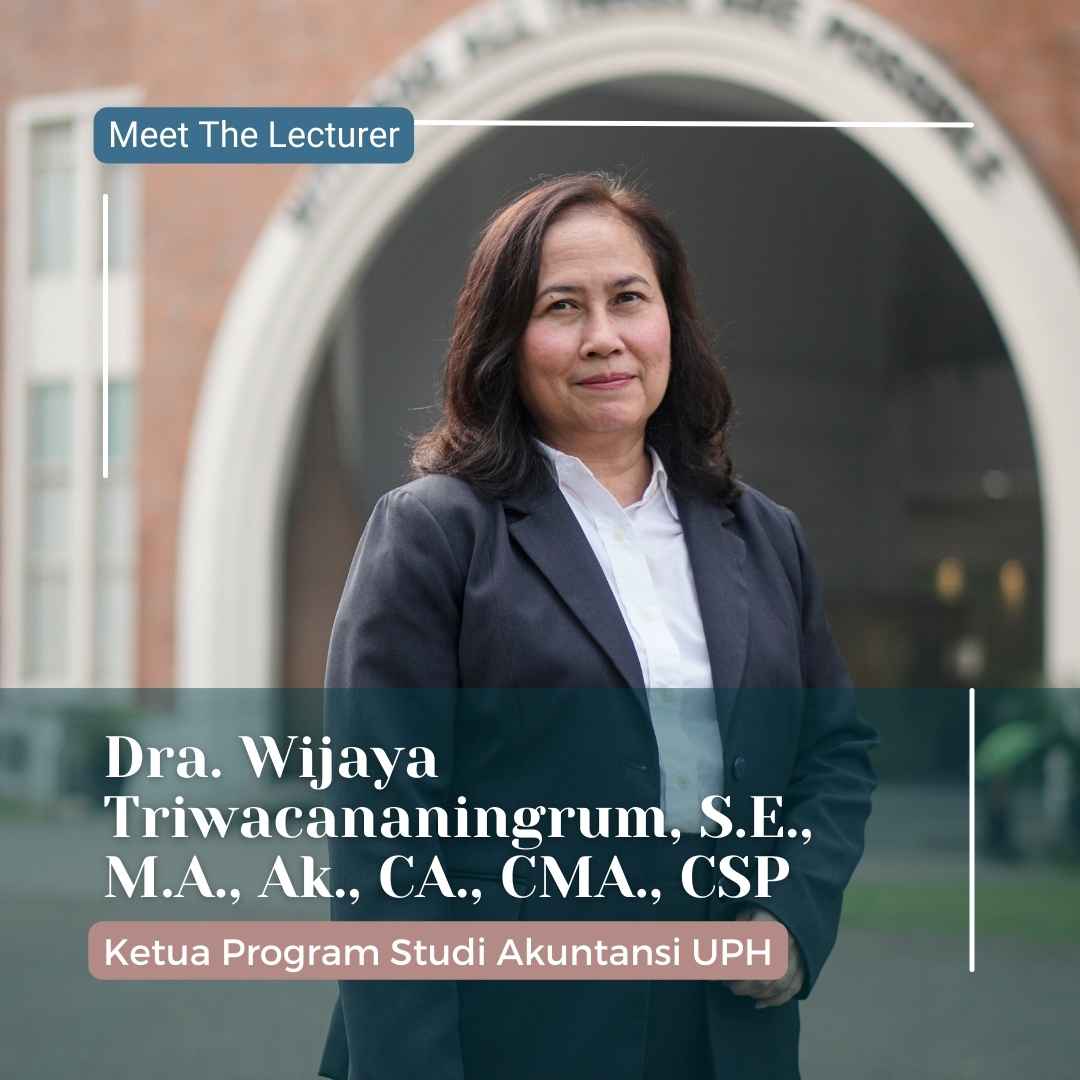2023
Dr. Wijaya Triwacananingrum: Dedication to the Advancement of Accounting in Indonesia.

Dr. Wijaya Triwacananingrum, S.E., M.A., Ak., CA., CMA., CSP., is an esteemed academic who has dedicated herself to the field of accounting in Indonesia. Currently, she serves as the Head of the Accounting Program at Universitas Pelita Harapan (UPH). Since 2016, Wijaya has been actively teaching various courses at UPH, including Managerial Accounting, Sustainability Reporting, Cost Accounting, and Basic Financial Accounting. For Wijaya, accounting is a crucial aspect in both profit-oriented and non-profit organizations, which is why she continues to deepen her knowledge in accounting to this day.
Wijaya’s experience in the accounting world is undeniably impressive, as evident from her achievements as an accountant and lecturer. One of her notable accomplishments was the publication of reputable Scopus-Q3 journal articles in 2019, titled “Enhancing the Task Performance of Bank Employees: Relevance of Trust, Self-efficacy, and Budget Participation,” and Scopus-Q1 titled “Interactive Performance Measurement System and Team Performance ? Towards Optimal Organizational Utility.” Additionally, in 2022, she published another article titled “Sustainability Reporting and Tax Aggressiveness Before and During Covid-19: Gcg Moderating Variable” in the Sinta 2 Journal of Accounting and Finance Indonesia (JAKI). Apart from academic publications, Wijaya frequently gives guest lectures at other universities. In 2022, she also served as the General Chairperson of the Accounting Scientific Conference (KIA-IX).
Wijaya earned her bachelor’s degree in economics from Universitas Negeri Surabaya and a bachelor’s degree in accounting from Universitas Airlangga Surabaya. She further pursued her master?s in accounting at Universitas Airlangga Surabaya and completed her Doctoral Program in Economics with a specialization in accounting to equip herself for a career in academia. Additionally, she obtained several certifications, including Certified Management Accountant (CMA) and Certified Sustainability Practitioner (CSP).
Before deciding to become an academician, Wijaya worked as an accounting consultant and practitioner at a Public Accounting Firm (KAP). In 2008, armed with her practical experience and a completed master?s degree in accounting, Wijaya made the decision to dedicate herself to teaching as a lecturer.
“In 2008, I felt a calling to become an academician. I believed it was the right time to share knowledge with accounting students, who would eventually become the next generation of professional accountants. My aspiration was to share my knowledge and industry experience with the students. One of my primary goals was to bridge the gap between academia and industry, ensuring that the accounting knowledge possessed by students would be more closely aligned with the practical requirements of the field,” expressed Wijaya.
For Wijaya, being a lecturer in Accounting at UPH is a valuable opportunity to contribute to preparing the next generation and advancing education in Indonesia. She feels honoured and deeply grateful for this chance, which allows her to contribute to the future of accounting through her teaching.
According to Wijaya, the accounting landscape in Indonesia has seen significant changes since the Covid-19 pandemic era. Many shifts and adjustments have occurred in response to the global economic situation. For instance, there has been a transition from traditional accounting to sustainability accounting, with businesses now more conscious of not only shareholders’ interests but also the stakeholders. Technological advancements have also impacted the accounting processes, leading to digitalization and increased efficiency.
Addressing professionals and aspiring accountants, Wijaya advises them to continuously enhance their knowledge by studying various relevant disciplines and adapting to the economic conditions that can affect corporate businesses. She believes that accountants must be adaptable to the changing times, especially since there are concerns about technology potentially replacing the role of accountants in the near future.
“I believe that accounting sector will always have bright prospect since it is one of the fundamental pillars of business. Technological advancements will indeed significantly transform accounting practices. However, it will not entirely replace the role of accountants. It will continue to change the way we do accounting, but the human role in applying knowledge, interpretation, and analysis remains paramount in the accounting world. As accountants, we must continuously enhance our knowledge in line with the demands of the times and always be ready to adapt to economic conditions that can impact corporate businesses,” explained Wijaya.
Furthermore, according to Wijaya, formal education is a crucial foundation for aspiring accountants. She added, “In addition to taking courses in the accounting program, accountants must equip themselves by taking the certification exams organized by the Indonesian Institute of Accountants (IAI) to obtain the titles Ak (Accountant) or CA (Certified Accountant). This is important to demonstrate our expertise in the field of accounting.”
For the accounting profession in Indonesia, Wijaya hopes to see an increasing number of professional accountants, especially in the field of sustainability accounting. In this way, their expertise aligns with current developments.
“In Indonesia, there is still a need for professional accountants who are in line with the current business developments that emphasize corporate sustainability. The development of standards, especially related to corporate sustainability, needs to be continuously monitored and updated to meet the requirements of sustainable accounting in Indonesia,” concluded Wijaya.



